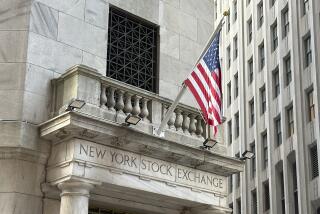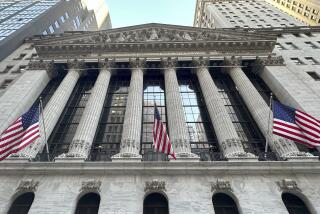Bond Rates Surge to 9-Month Highs on Inflation Data
- Share via
New signs of inflation and expectations of another Federal Reserve Board interest rate hike sent Treasury bond yields soaring to nine-month highs Friday. But the yield rise may soon be ending, many experts say.
While many economists and bond investors expect yields to soon reach two-year highs, they predict that economic growth will slow later this year. That will probably result in bond yields topping out--and possibly falling.
That also could make now a good time to buy bonds, some investors said.
“The economy is going to slow down--beginning now,” said Bruce Steinberg, an economist at Merrill Lynch, who predicts news of more sluggish economic growth by June. He also believes the Fed will increase lending rates by a quarter or half a percentage point at its May 20 meeting, to slow the economy and keep inflation from picking up.
“While the Fed will be doing some tightening in May, we are going to see, in the next few months, lower bond yields than we have now,” Steinberg said.
The yield on the benchmark 30-year Treasury bond closed Friday at 7.16%, up from 7.10% the day before. That’s the highest level since July, and close to a two-year high of 7.25%. The rise was sparked by a report showing higher consumer spending and a larger-than-expected rise in wholesale price inflation, excluding volatile food and energy components.
But if rates indeed are close to peaking, that would be good news for home buyers hoping to lock in the cheapest mortgage rates. It would also cheer stock market investors, who have blamed rising rates for recent sharp declines in share prices.
While many bond investors are taking a wait-and-see approach about buying more bonds, today’s attractive yields will prompt other major investors to jump back in the bond market. That will boost prices, which in turn lowers yields.
William Gross, one of the nation’s largest bond investors, with $75 billion of bonds under management at Pimco Advisors in Newport Beach, said he plans to buy about $5 billion of bonds in the next two weeks.
“My sense is that the economy is going to weaken from here,” Gross said, predicting that while economic reports next week may be strong, robust economic growth will not continue. “We’re going to be shocked at how quickly it slows down from this point--though I admit that’s certainly not the case now.”
“The bond markets, particularly Treasuries, have been in a negative mood for weeks now,” said A.G. Edwards economist Gary Thayer.
“Those markets periodically go to extremes of emotion, but they may have overdone it a little today,” he added. “I’m not sure we’ve seen the highest yields of the year yet, but bonds at this level should be very attractive.”
But even major bond investors and economists like Thayer have been wrong before. And not everyone agrees the economy will falter.
Dave Capurro, who manages $500 million of short-term government bonds for Franklin Funds in San Mateo, Calif., said he expects more interest rate hikes this year, though a stronger dollar--which makes U.S. securities attractive to foreign investors--should keep interest rates from rising as fast and as far as in 1994.
“There’s nothing on the horizon to look like this economy will slow down,” he said.
Noting the economy grew at a 3.8% rate during the first quarter, Capurro predicts most bond buyers will remain cautious through the first half of 1997, as concerns about future rate increases will keep them on the sidelines, he said.
“The Fed usually doesn’t just act once, so investors are waiting for the other shoe to drop,” he said.
Bond yields have already climbed more than a quarter of a point since March 25, when the Fed raised its overnight bank loan rate to 5.50% from 5.25%. Bond investors will get more evidence of whether the economy is growing and inflation quickening with next week’s release of the consumer price report for March.
Friday’s reports, added to previous signals of economic strength and wage growth, mean there is more inflation risk this year than last, but there remains very little measurable increase in consumer prices so far, economists say.
* DOW PLUNGES
The industrial average fell 148.36 points, for its fifth straight weekly loss. A1
* PRICE PRESSURES
Inflation indicators seem to suggest the Federal Reserve Board will raise rates again soon. D2
More to Read
Inside the business of entertainment
The Wide Shot brings you news, analysis and insights on everything from streaming wars to production — and what it all means for the future.
You may occasionally receive promotional content from the Los Angeles Times.









